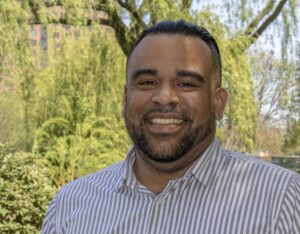This Is My Hartford is a series from the MetroHartford Alliance where we connect with local business owners, community drivers, residents, and employees to find out how the Hartford Region has shaped them throughout their career, and what they have done to shape our city and region.
By Nan Price, Content Manager, MetroHartford Alliance
 Next in our series, Joel Rivera, Initiative Director for the Hartford Working Cities Challenge at the United Way of Central and Northeastern Connecticut.
Next in our series, Joel Rivera, Initiative Director for the Hartford Working Cities Challenge at the United Way of Central and Northeastern Connecticut.
WHY HARTFORD?
JOEL RIVERA: I’m a native of Hartford, born and raised here. I went to Hartford Public Schools and graduated from Bulkeley High School. I went off to college in 1994 and came back to Hartford in 2004. This is where my roots are. I live and work in Hartford and am passionate about serving my community by helping to change systems that traditionally don’t work for most communities of color.
HOW HAVE YOU BECOME A PART OF HARTFORD?
JOEL: Hartford has always been a part of me. More specifically, in the past year, I started working for the United Way of Central and Northeastern Connecticut as an Initiative Director for the Hartford Working Cities Challenge (HWC). HWC is a collaborative effort involving various Hartford community organizations in a place-based initiative that addresses two significant issues facing Hartford: Poverty and the need for an educated workforce to attract and retain employers to the city and the region.
HWC’s approach emphasizes engaging employers and young adults (ages 16 to 29) and aligning and coordinating employment services using sector-based employment and positive youth development strategies. Through this work we seek to improve access to good jobs for young adults, improve employers’ access to a qualified local labor pool, and improve neighborhood stability.
HOW HAS HARTFORD BECOME A PART OF WHO YOU ARE?
JOEL: I’m part of a network, a system of community residents and community organizations all striving to reach the same result, which is to move the needle on poverty through our workforce development programs. Throughout the network I inspire hope by sharing my lived experience and my unique connection to Hartford. I am Hartford.
WHAT DO YOU FEEL UNIQUELY MAKES HARTFORD…HARTFORD?
JOEL: Hartford is unique because we have resilient people and communities that want more. They want change and access to opportunities. Hartford is a small city. If something happens on one end of the city the other end will find out. This close fabric of people, communities, and organizations and everything that makes up Hartford is unique to us.
HOW DO YOU “TELL THE STORY” OF HARTFORD?
JOEL: I have many stories of Hartford, growing up in the north end of Hartford and then moving to the south end my junior year of high school, the times I spent in downtown Hartford with my friends and family.
Downtown Hartford was the place to be on the weekends with the shops and the G. Fox building, which is now Capital Community College, among other things. Hartford to me was a vibrant city. It went through a period where the city came to a halt, everything stopped, and businesses and people moved out.
I usually talk about the times I spent outside in the projects with my neighborhood friends. I talk about Barnard Brown, now Capital Prep, and my experiences walking to school. I also talk about how I had access to several social programs and teachers that helped me along the way and connected me to opportunities. I talk about the reasons why I left Hartford and came back. I have had the most financial success, excellent employment opportunities, and now an opportunity to serve my city.
WHERE DO YOU SEE HARTFORD IN THE NEXT FIVE TO 10 YEARS?
JOEL: I see Hartford thriving in the next five to 10 years. Currently, the city, non-profit organizations, employers, and the community at large are helping to transform systems so they’re inclusive of everything that makes up Hartford.
There’s a resurgence coming from young adults native to Hartford who want change and are part of these systems changes. I see a thriving manufacturing industry with pipelines to these jobs. I see the community having better access to information and organizations in a more coordinated way. I see more options and possibilities for the people of Hartford.
